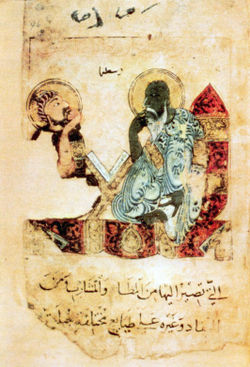Jabril ibn Bukhtishu


Jabril ibn Bukhtishu, (Jibril ibn Bakhtisha) also written as Bakhtyshu, was an 8th-9th century physician from the Bukhtishu family of Assyrian Nestorian physicians from the Persian Academy of Gundishapur. He was a Nestorian[1] and spoke the Syriac language.[2]
Grandson of Jirjis ibn Jibril, he lived in the second half of the eighth century.
He was physician to Ja'far the Barmakide, then in 805-6 to Harun al-Rashid and later to al-Ma'mun; died in 828-29; buried in the monastery of St. Sergios in al-Madain (Ctesiphon).
He wrote various medical works and exerted much influence upon the progress of science in Baghdad. Works attributed to him include Kitāb ṭabā’i‘ al-ḥayawān wa-khawāṣṣihā wa-manāfi‘ a‘ḍā’ihā ('Book of the Characteristics of Animals and Their Properties and the Usefulness of Their Organs'), written for Nasir al-Dawla; Risāla fī al-ṭibb wa-al-aḥdāth al-nafsāniyya ('Treatise on Medicine and Psychological Phenomena'); and Kitāb naʿt al-hayawān.[1] He was a member of the Bakhtyashu family. He took pains to obtain Greek medical manuscripts and patronized the translators.
See also
[edit]Further reading
[edit]- F. Wüstenfeld, Arabische Aerzte (15-16, 1840).
- Lucien Leclerc, Médecine arabe (vol. 1, 99-102, 1876).
- Max Meyerhof, New Light on Hunain ibn Ishaq (Isis, VIII, 717, 1926).
References
[edit]- ^ a b Contadini, Anna (2003). "A Bestiary Tale: Text and Image of the Unicorn in the Kitāb naʿt al-hayawān (British Library, or. 2784)" (PDF). Muqarnas. 20: 17–33. doi:10.1163/22118993-90000037. JSTOR 1523325.
- ^ "Islamic Culture and the Medical Arts: Greek Influences". U.S. National Library of Medicine.
Further reading
[edit]- Weststeijn, Johan (2008). "Van het Reve on 'Literaturwissenschaft'". In Haard, Eric Alexander; Stelleman, Jenny (eds.). Literature and Beyond: Festschrift for Willem G. Weststeijn on the Occasion of His 65th Birthday. Pegasus. pp. 867–884. CiteSeerX 10.1.1.690.4414. hdl:11245/1.295297. ISBN 978-90-6143-326-2.